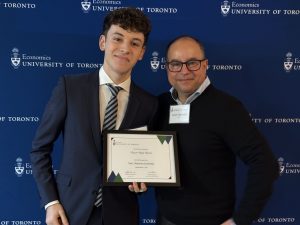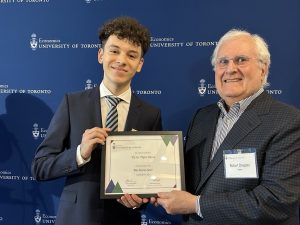
On the St. George campus, it’s rare for an undergraduate to hold a teaching assistant position. According to Professor of Economics Marcin Pęski the TA co-ordinator for the Department of Economics, only 12% of TA hours are completed by undergrads. That number is much larger at the UTM campus where tutorials are typically run by undergraduates.
New graduate Victor Popa Burca was one of those rare undergraduate TAs for Professor Joseph Steinberg’s course Introduction to Macroeconomic Theory.
“I was TAing ECO208 when I was in third year,” said the Innis College student whose convocation is next week. “I felt like I connected more closely to the students because I had taken the course just the year before. I brought a student’s approach to the course. I was like, ‘Guys, I was just where you are now. I’m here to help you. If I could do this, you can do it.’ I feel that people were more comfortable with me than with a sensei-type teaching assistant, you know?”
Burca gave students in his Macroeconomic Theory tutorial three key pieces of advice:
- Get into a routine
“If it’s a lecture day, get into the routine of showing up and being present. Show up to every class and every tutorial,” Burca said. “Even if you don’t do the tutorial prep work beforehand, and just see the answers with me in class, you’re guaranteed at least a 70. There’s no way you’ll get below a 70 if you go to every class and every tutorial.’ If you don’t miss a day, that’s what you’re guaranteed. They’re not going to put material on the test that you haven’t seen.”
Burca’s days without lectures or tutorials also had their own routine.
“If it’s a non-lecture day, then I try to get my work out of the way as soon as I can to leave time for other stuff like tennis or skiing depending on whatever the weather is outside. Going outside and getting a little active is important. I’ve noticed that when students get completely sucked into studying and just work, they become inactive and it’s unhealthy. Sitting down all day isn’t good for your mental health either. You need to boost those endorphins somehow.”
- Take time to plan
“Take a few minutes every week to think about what you have to do and make a plan for how and when you’re going to deal with all of it,” Burca said. “You don’t need to complicate it with a scheduling tool, or an app. You just need to have a list of all your work in mind and get through it. It’s easier to do a lot of work when you know exactly what to do now and what to do next.”
- Visit your professors during office hours
“You don’t have to go to every office hour or go out of your way to work it into your weekly plan, but go once in the beginning, and then once near the end of the course. Then your profs will remember you when you participate in class. It’s certainly useful, not only for your success in the class, but also down the line. Going to office hours helped me get my job with Professor Steinberg because he remembered me and remembered that I did well.”

Burca also has advice for newer undergraduates that he didn’t give to students in his tutorial.
“One thing I would change if I were to do my undergrad again would be to get involved in at least one club,” he said. “I feel like I was too much in my own world with my own friends, so I didn’t want to expand out and go to different clubs, but they’re very useful. You meet new people quickly. And another thing, don’t be scared to ask people in third or fourth year for advice. It really helps to get a second opinion on what program to take and what kind of job prospects there are.”
Taking and then TAing in ECO208 has left a significant impact on Burca’s plans for the immediate future.
“I’m interested in macroeconomics right now, and I’ve been interested ever since I took that class with Professor Steinberg, Burca said. “I just haven’t had the time to sit down by myself and think about an original research direction I want to go in. I want to have a bit more direction so I can contribute to the field in some way.”
To seek that direction, Burca will be returning to the Department of Economics in the fall of 2025 to start his master’s degree. He said his studies will certainly include graduate level classes in macroeconomics.
Return to the Department of Economics website.
Scroll more news.
